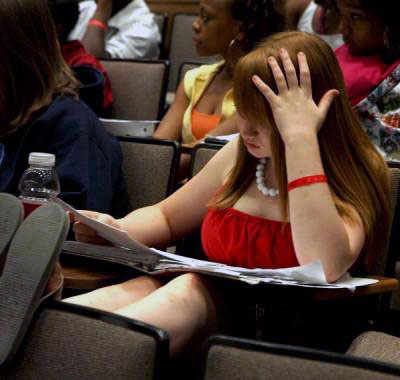All Nonfiction
- Bullying
- Books
- Academic
- Author Interviews
- Celebrity interviews
- College Articles
- College Essays
- Educator of the Year
- Heroes
- Interviews
- Memoir
- Personal Experience
- Sports
- Travel & Culture
All Opinions
- Bullying
- Current Events / Politics
- Discrimination
- Drugs / Alcohol / Smoking
- Entertainment / Celebrities
- Environment
- Love / Relationships
- Movies / Music / TV
- Pop Culture / Trends
- School / College
- Social Issues / Civics
- Spirituality / Religion
- Sports / Hobbies
All Hot Topics
- Bullying
- Community Service
- Environment
- Health
- Letters to the Editor
- Pride & Prejudice
- What Matters
- Back
Summer Guide
- Program Links
- Program Reviews
- Back
College Guide
- College Links
- College Reviews
- College Essays
- College Articles
- Back
Rise and Shine!
Is there anything you dislike more than the sound of your alarm dragging you out of that deep, dark slumber that probably just started a few hours ago? If you’re like me, you’ve tried all kinds of different sounds for that alarm on your phone, when in reality, they’re all saying the same thing: GET OUT OF BED! Sleep is fuel for the brain and is crucial to succeed. Sleep deprivation impairs students’ ability to pay attention, solve problems and cope with stress. Trying to go to bed at a reasonable hour seems unthinkable for some students who participate in afterschool sports or activities, have homework, and need to eat dinner in a small period of time. Moving the school’s start time an hour ahead would allow the students to get that extra hour of sleep they need to be more alert and ready to learn in school. There are many factors that contribute to a student’s ability to excel in school: good study habits, smart and engaging teachers, self-discipline, and most importantly, the right amount of sleep. Without the appropriate amount of sleep, a student is less capable of maintaining successful study habits.
An early start time can be beneficial to both teachers and families. Students have more time for extracurriculars and after-school jobs, and it works better with the parents’ schedules to have the children go to school earlier. Changing the school time could result in struggles with transportation and difficulties for families for adapting to the change. Schools are able to save up to 30% on transportation when they have an early start time. If the start times changed, it would affect all the schools in the district by forcing them to change times to make the schedule work. Although these are all important factors, the advantages outweigh the small, negative effects.
The American Academy of Sleep Medicine states that teens, ages 13 to 18, should regularly sleep eight to ten hours to have good health. “Early school start times make it difficult for adolescents to get sufficient sleep on school nights,” states Dr. Nathaniel Watson, lead author and AASM past president. The teens that fail to get eight to ten hours of sleep are more likely to become overweight, not engage in physical activity, perform poorly in school and suffer from symptoms of depression. Being sleep deprived impairs a teen’s ability to be alert, pay attention and retain information. Without reasonable sleep and rest, overworked neurons can no longer function to coordinate information properly causing a loss in our ability to access previously learned information. Students that go to schools with an early start time can struggle in their first period classes because they do not get much sleep and cannot focus to retain the information that’s being taught.
Car accidents are the leading cause of death in teenagers. Many students drive themselves to school and not getting enough sleep each night can lead to drowsy driving. National Highway Traffic Safety Administration estimates that driver fatigue causes 100,000 crashes each year. “Sleep isn’t a priority for teens, and it typically isn’t made one by parents or schools” says Jodi Mindell, PhD, Director of Graduate Program in Psychology. Driving while being overtired can be dangerous for the driver, passengers, and other drivers on the road. While tired, teens could have a delayed reaction if something happened or you could accidentally doze off behind the wheel. In terms of risk, drowsy driving is similar to drunk driving.
The school start time should shift one hour later, so students receive more sleep. Even though the time change would affect the school and families, the benefits will outweigh any future issues. The students will be less dependent on caffeine and more likely to excel at school. In addition, drowsy driving will be less common. Schools should synchronize the school start time with the students’ body clocks to provide them with the ability to achieve their highest academic potential.

Similar Articles
JOIN THE DISCUSSION
This article has 0 comments.

I am a high school student and I can relate to this topic very much and believe there should be a change.